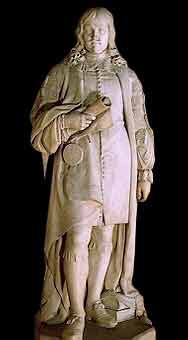Edward Hyde, 1st Earl of Clarendon (1609-1674)
© 2007
Armchair Travel Co. Ltd. - This page may be used for non-commercial purposes
ONLY!
![]()

[ Play
Narrated and Animated Movie ! ] No man spoke with more weight and dignity in council and Parliament. No man was better acquainted with general maxims of statecraft. No man observed the varieties of character with a more discriminating eye. But his temper was sour, arrogant and impatient of opposition.
Clarendon is probably the most famous historian of the English Civil War. He entered Parliament in 1640, and in 1645 served as King Charles I's representative in the making of a determined effort to end the Civil War. The following year Clarendon became principal adviser to the future king, Charles II and, on realising that Charles I was losing all power, the two fled to Holland and remained in exile until the Restoration. On his return, Clarendon was made Lord Chancellor (1660), and was created a baron. The following year he was made the Earl of Clarendon.
As Lord Chancellor he gave his name to the Clarendon Code which imposed restrictions on religious dissenters. Unfortunately, his close relationship with the king led to furious jealousy in Parliament - not aided by the marriage of his daughter to the king's brother the Duke of York (the future King James II). In July 1663 Parliament attempted to impeach Clarendon, but failed. In 1667 Parliament secured his dismissal, followed by another attempt at impeachment. Clarendon withdrew to the continent during the proceedings against him, and as a result was then banned from returning to Britain by the Commons, and was thus exiled for life. He devoted the last six years of his life to writing his 'History of the Grand Rebellion', considered to be one of the most accurate and comprehensive accounts of the Civil War.
He had too much levity in his wit, and did not always observe the decorum of his post. He was high, and was apt to reject those who addressed themselves to him with too much contempt.
[ Virtual
Tour ] [ Main Topics
Index ]
- T.B. Macaulay, History of England.


Additional Information on
Edward Hyde, 1st Earl of Clarendon (1609-1674)
QUOTATIONS
- Gilbert Burnet, History of My Own Time.
Explore-Parliament.net: Advanced Category Search
Keyword Categories:
_Politician
_Man
_Person
_Peer
_Artist_Marshall
_Object_Sculpture
_Object_Artwork
_Object_Portrait
_Clarendon